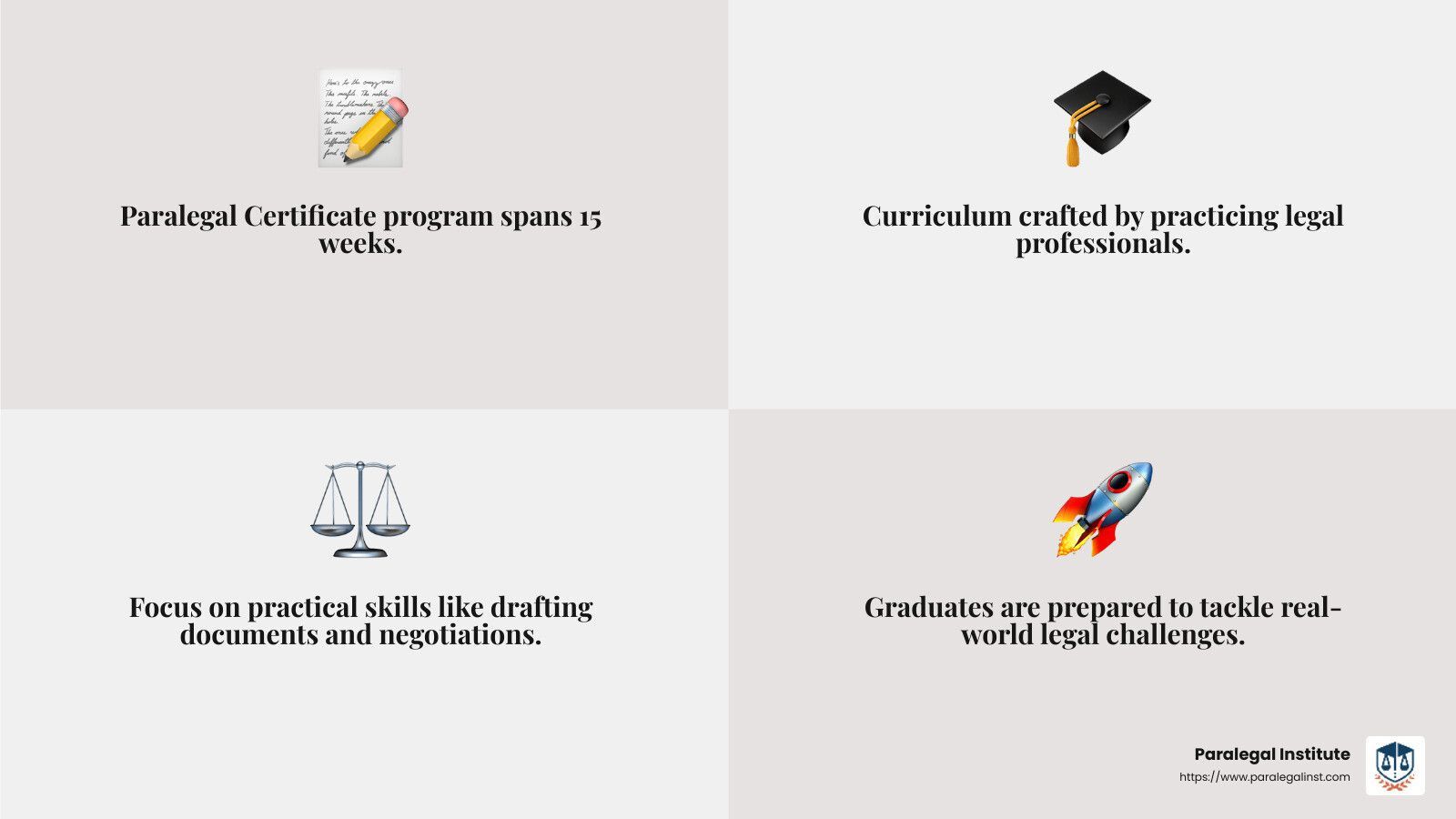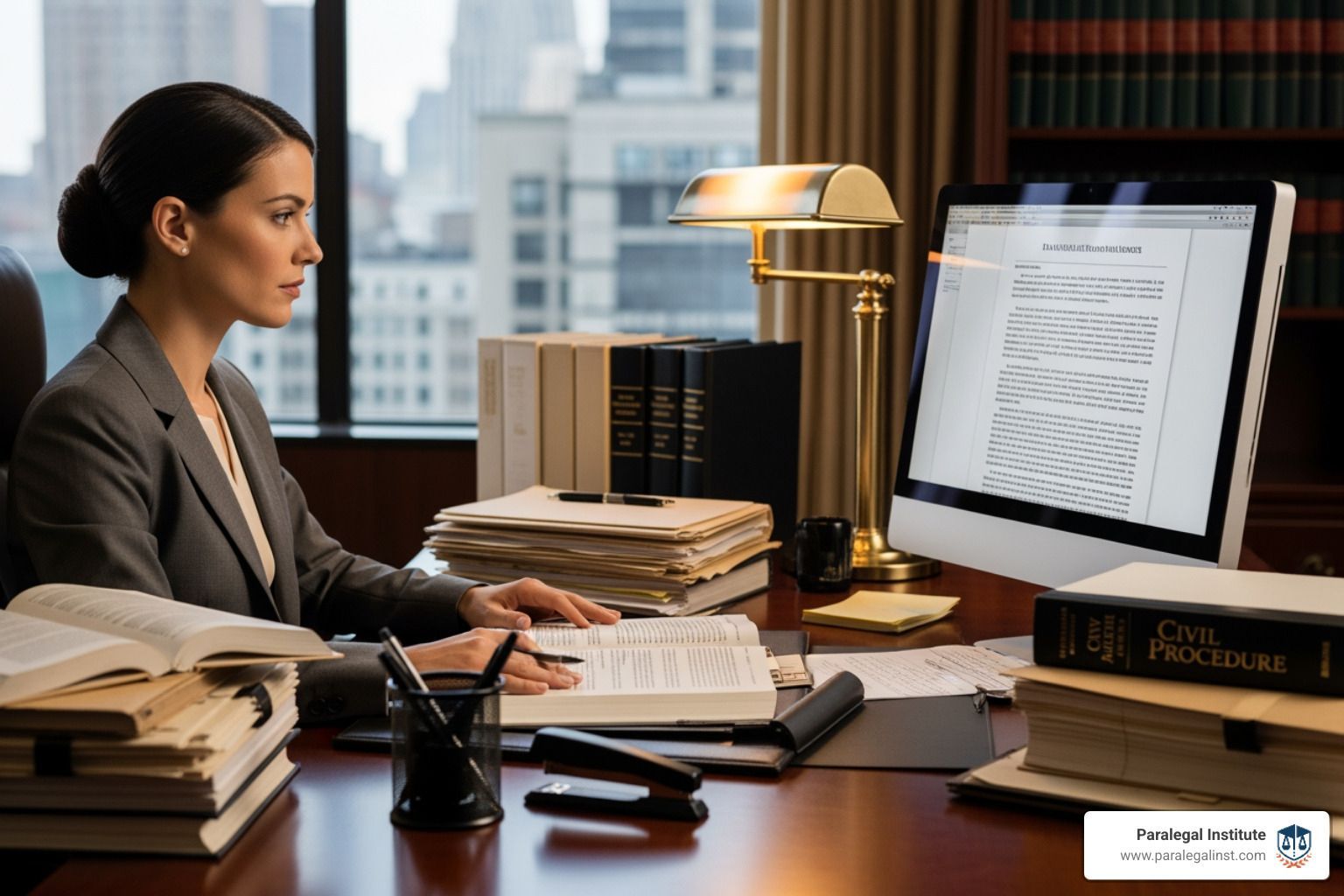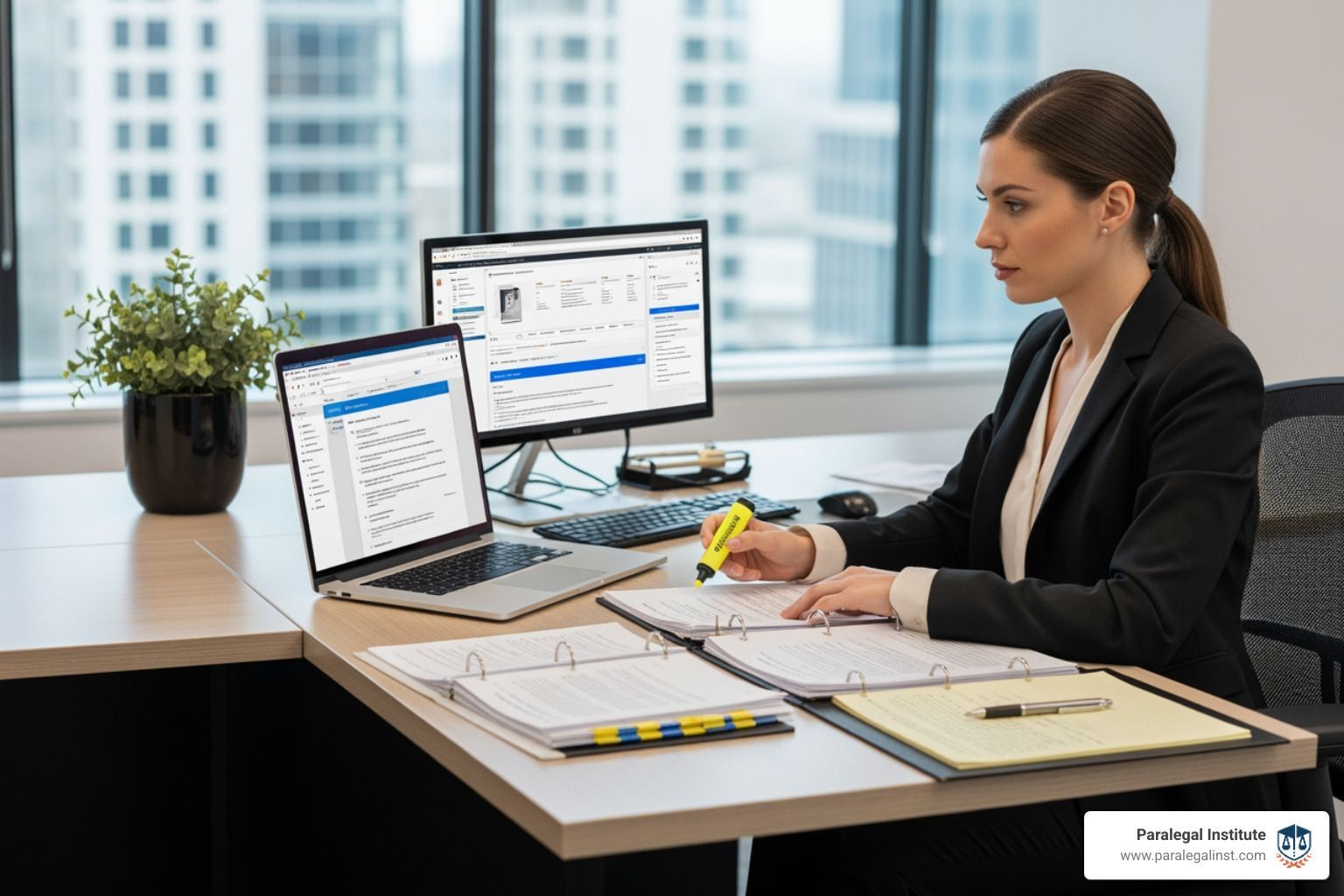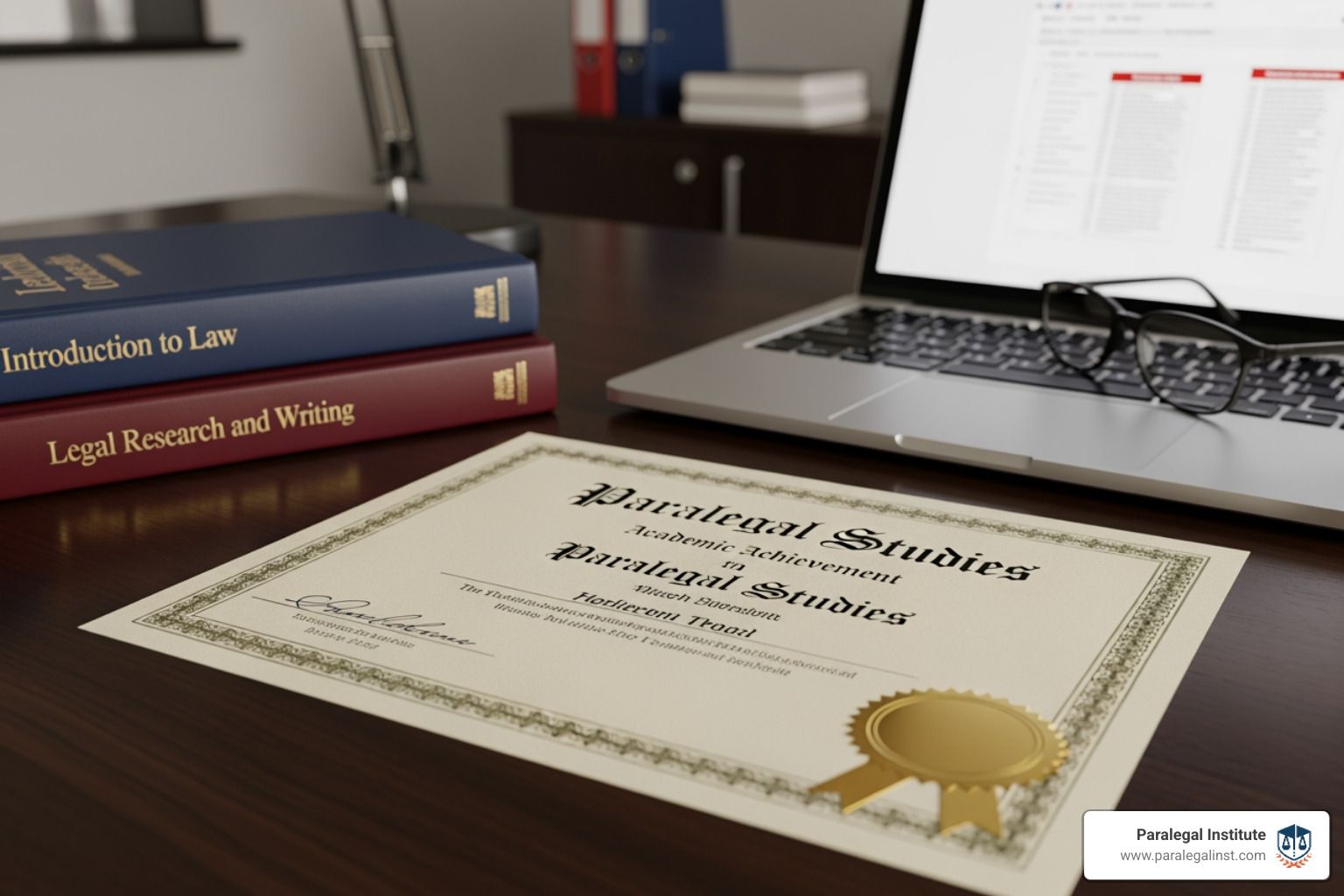How to Conquer These Hands-On Legal Training Challenges
Hands-on legal training is essential for aspiring legal professionals eager to gain practical skills needed in the dynamic legal environment. This type of training bridges the gap between theoretical knowledge and real-world application, equipping students with the tools to tackle various legal tasks effectively. Here's a quick glimpse into what it offers:
- Real-Client Representation: Gain experience by handling actual legal cases under supervision.
- Simulation Courses: Engage in mock trials and depositions to hone your skills.
- Skill Workshops: Participate in intensive workshops focused on specific legal skills like contract drafting.
My name is Matthew Pfau, and I've spent years working and teaching within the legal sector, focused particularly on hands-on legal training. I guide aspiring paralegals like you in gaining the practical legal skills needed for success in this field.
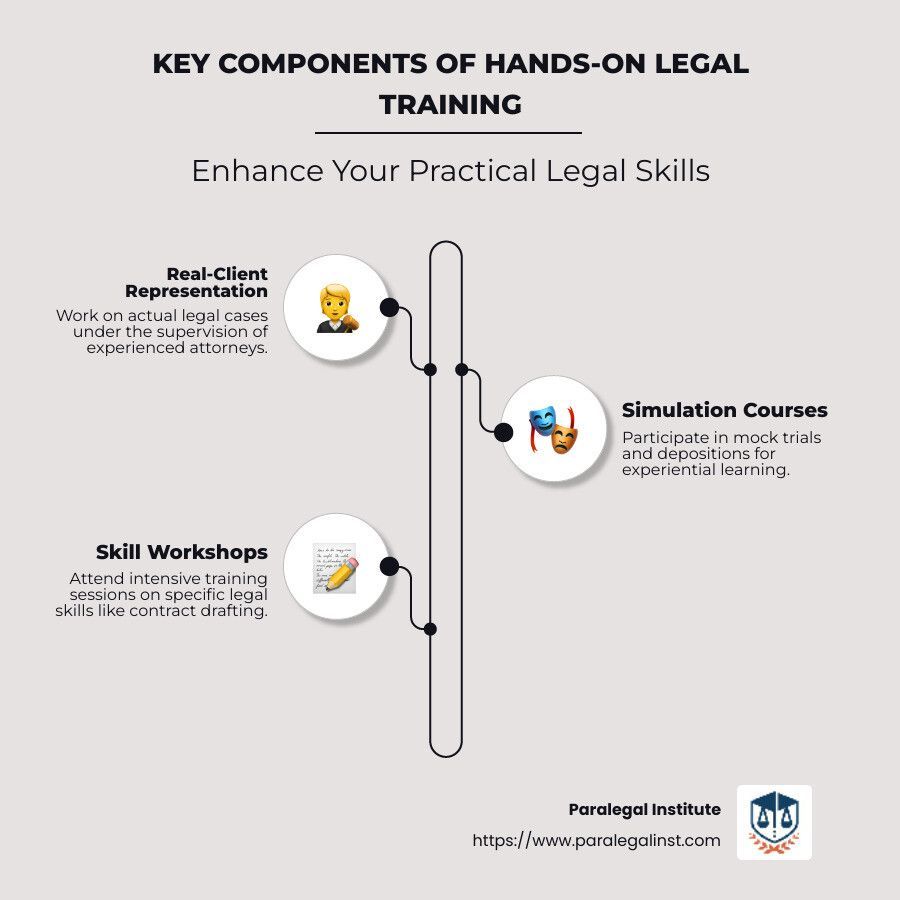
Understanding Hands-On Legal Training
Experiential learning is at the heart of hands-on legal training. This approach goes beyond textbooks, immersing students in real-world legal scenarios. By engaging in activities that mimic actual legal work, students develop a deeper understanding of legal procedures and practices.
Practical Client Interaction
One of the most impactful components of hands-on legal training is practical client interaction. Imagine working on legal scenarios that closely resemble real cases while still in training. This experience allows students to apply their knowledge in a practical setting, under the guidance of experienced legal professionals. At the Paralegal Institute, for example, students engage in exercises that simulate real-world legal challenges, gaining invaluable insights into the complexities of legal practice.
Why is this important?
- Real-World Experience: Handling realistic scenarios prepares students for the challenges they will face in their careers.
- Confidence Building: Working through these exercises helps build the confidence needed to handle legal matters independently.
Simulation Courses
Simulation courses are another key element of effective hands-on training. These courses offer a controlled environment where students can practice legal skills without the pressure of real-world consequences. The Paralegal Institute provides intensive simulation workshops like Deposition Skills and Due Diligence in Business Transactions.
Benefits of Simulation Courses:
- Risk-Free Learning: Students can make mistakes and learn from them without real-life repercussions.
- Skill Development: Through role-playing and mock trials, students improve their skills in areas such as negotiation and advocacy.
Bringing It All Together
Experiential learning, practical client interaction, and simulation courses combine to create a comprehensive training experience. This approach ensures that students are not only knowledgeable about legal theories but also adept at applying them in real-world situations. By participating in these hands-on opportunities, aspiring legal professionals can bridge the gap between theory and practice, setting the stage for a successful career in law.
Key Components of Effective Hands-On Legal Training
Work Actual Case Files
The Paralegal Institute provides students with the opportunity to work on real cases. Students engage in practical exercises that simulate real-world legal scenarios, enhancing their skills and understanding of the legal process. This not only improves their practical skills but also instills a sense of social responsibility.
- Practical Application: Students apply what they've learned in the classroom to real-life situations.
- Mentorship: Experienced legal professionals guide students, offering feedback and support.
Externships
Externships are another vital component, offering students the chance to work in a legal setting outside of their school. These placements can be in law firms, government agencies, or non-profits, providing a diverse range of experiences. Students at the Paralegal Institute can gain exposure to various legal environments, which is crucial for their professional development.
- Diverse Experiences: Externships offer exposure to various legal environments and practices.
- Networking Opportunities: Students build professional connections that can be invaluable in their future careers.
Skills Simulations
Skills simulations are designed to mimic real-world legal scenarios in a controlled environment. These simulations allow students to practice essential legal skills, such as deposition taking and due diligence, without the pressure of real-world consequences.
- Safe Learning Environment: Students can experiment and learn from mistakes without real-world repercussions.
- Focused Skill Development: Simulations target specific skills, such as negotiation and advocacy, crucial for legal practice.
By integrating real world case files, externships, and skills simulations, hands-on legal training equips students with the practical skills they need to succeed in their legal careers. These components ensure a well-rounded educational experience, bridging the gap between academic learning and real-world application.
Overcoming Common Challenges in Hands-On Legal Training
Bridging the Gap in Paralegal Education
Many graduates entering the paralegal field feel unprepared for the practical demands of their roles. Traditional educational programs often emphasize theory, leaving a gap in practical skills development. This is where hands-on legal training becomes essential, offering students the opportunity to apply theoretical knowledge in real-world contexts.
For instance, the Paralegal Institute offers programs that provide students with hands-on experience in various legal fields. These programs not only expose students to real cases but also help them develop practical skills that are crucial for their future careers.
Developing Practical Skills
Practical skills are the foundation of effective paralegal work. Through skills simulations and real-client work, students can practice and refine these skills. For example, students engage in simulated exercises, honing their abilities in areas like document preparation and legal research.
In addition to simulations, externships offer invaluable opportunities to work alongside experienced legal professionals. These experiences help students develop critical skills such as contract drafting and negotiation, which are often not covered in detail during traditional education. As noted in recent trends, legal organizations are increasingly using platforms that combine online and experiential learning to train new paralegals in these practical areas.
Feedback from Practitioners
Receiving feedback from experienced practitioners is a critical component of improving one's legal skills. In settings like workshops, students engage in exercises and receive immediate feedback from instructors who are experts in the field. This real-time critique helps students identify strengths and areas for improvement, fostering a deeper understanding of effective legal strategies.
Moreover, feedback from practitioners during externships and practical work provides students with insights that are not accessible through textbooks. This mentorship is vital for developing the confidence and competence needed to navigate complex legal challenges.
By addressing these common challenges—bridging educational gaps, developing practical skills, and leveraging practitioner feedback—hands-on legal training empowers students to transition smoothly from academic environments to successful paralegal careers.
Frequently Asked Questions about Hands-On Legal Training
What is hands-on legal training?
Hands-on legal training involves active engagement in real-world legal tasks within controlled environments. This type of training allows students to apply their theoretical knowledge to practical situations, preparing them for the realities of legal practice. Unlike traditional classroom settings, hands-on training focuses on experiential learning—where students can participate in mock trials, draft legal documents, and engage in negotiations.
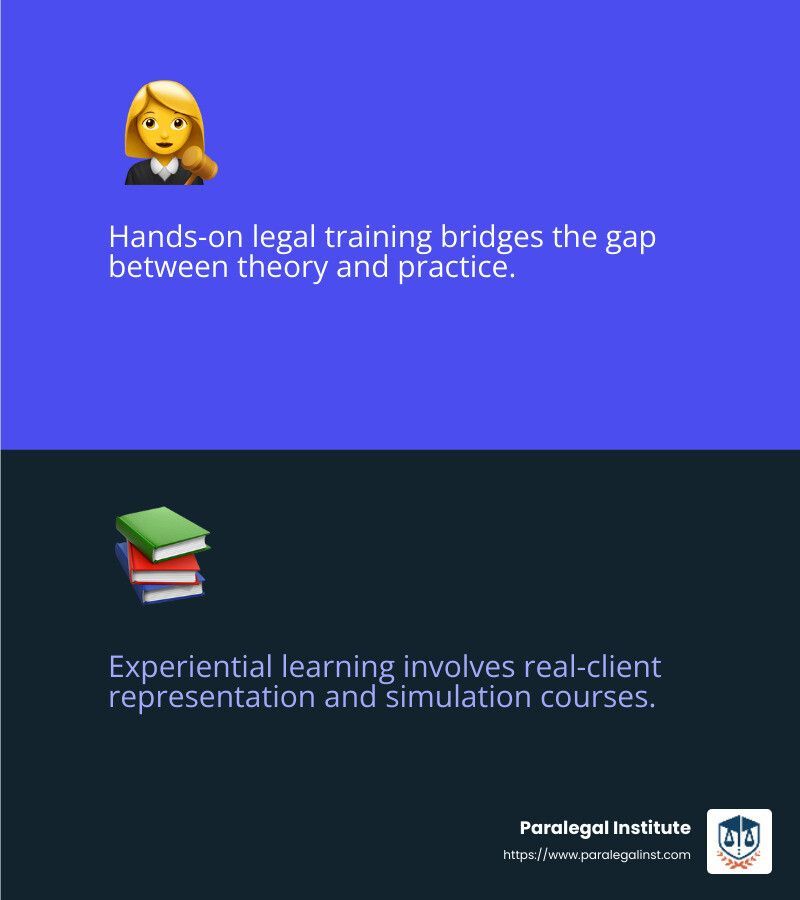
Which certificate courses are best for hands-on legal training?
When pursuing a Paralegal Certificate, certain courses are particularly beneficial for hands-on legal training. The Paralegal Institute offers students the ability to draft litigation documents starting from the initiation of litigation through to the end of litigation. These documents then become an essential part of a paralegal student's resume portfolio for potential employers.
By actively participating in these writing exercises, students can develop the hands-on skills necessary for a successful career in law.
Conclusion
At the Paralegal Institute, we understand the importance of bridging the gap between theoretical knowledge and practical application in legal education. Our accelerated curriculum is designed to equip students with the hands-on skills they need to thrive in the legal workforce.
Our 15-week Paralegal Certificate program focuses on practical skills development, ensuring that students are not just learning about the law, but also how to apply it effectively. This approach is crucial because the legal field demands professionals who can hit the ground running, ready to tackle real-world challenges from day one.
The curriculum is crafted by practicing legal professionals, ensuring that our students receive training that is relevant and up-to-date with current industry standards. Whether it's through drafting legal documents, participating in mock trials, or engaging in negotiation exercises, our students gain experience that prepares them for the complexities of legal practice.
By choosing the Paralegal Institute, students are investing in a future where they are not just prepared but empowered to excel in their legal careers. Our commitment to hands-on legal training ensures that graduates leave with the confidence and competence to make a meaningful impact in the legal field.
